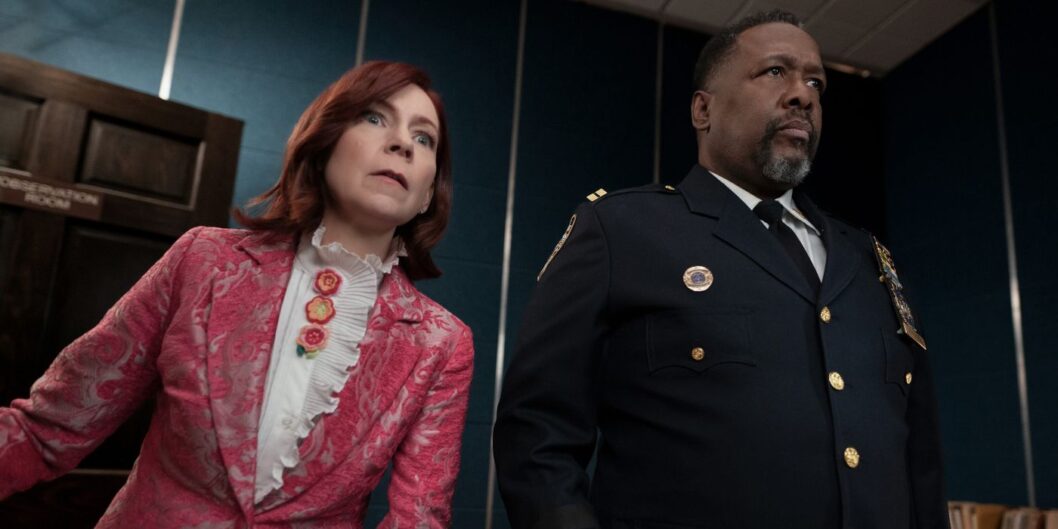Episode Recap: ‘Elsbeth’ Season 2 Episode 13 – "Tearjerker"
Overview
The latest installment of Elsbeth, Season 2 Episode 13, titled "Tearjerker," explored compelling themes of misogyny, privilege, and systemic failures within the police force while introducing a tangled murder mystery centered around the affluent New York City elites. This episode showcases the character Elsbeth (played by Carrie Preston), an attorney navigating through a barrage of suspect interactions that challenge her search for justice amidst societal inequalities.
Setting the Scene
The episode opens at an upscale Manhattan restaurant where billionaire Nathan Jordan, portrayed by Larry Pine, dines with a significantly younger date, Chloe, played by Jordana Brewster. Unbeknownst to Nathan, Chloe administers a lethal substance into his drink before seemingly caring for him in his apartment. When his estranged wife Deborah (Victoria Clark) discovers Nathan’s lifeless body, the investigation begins.
Character Dynamics and Conflict
The investigation is quickly obstructed by the arrival of Detective Rivers (Braeden De La Garza), a character characterized by arrogance and disrespect towards women in the precinct, which serves as a stark commentary on gender dynamics in law enforcement. Rivers’s brash demeanor and prejudiced assumptions lead him to arrest Deborah, the grieving widow, based purely on his misogynistic views. The tensions rise as Elsbeth and Officer Kaya Blanke (Carra Patterson) work to unravel the truth, battling not only the case’s complexities but also the toxic environment fostered by Rivers’s approach.
The Unfolding Investigation
As Elsbeth and Blanke delve deeper, they uncover inconsistencies and further complicate the narrative. While investigating Nathan’s medication, they discover pentobarbital, a strong sedative, among his bottles. Suspicion builds around both Deborah and Chloe, but evidence remains circumstantial. This leads Elsbeth to pursue the possibility of a romantic entanglement between Nathan and Chloe, suggesting the dynamics of power and motive could extend beyond simple monetary gain.
During their inquiries at Nathan’s apartment, Edgier tensions arise, with Rivers making baseless accusations against Deborah and exhibiting undue aggression towards Elsbeth as she attempts to defend her investigation methods. Elsbeth argues that the real issue lies with the dysfunctional power dynamics and frequent mistreatment of women in their society, a recurring issue highlighted throughout the series.
Climactic Revelations
As the narrative unfolds, Elsbeth ultimately uncovers layers of complexity surrounding Nathan’s death. It is revealed that Nathan, aware of his declining health, consciously contrived a plan leveraging the vulnerabilities of those around him. Through manipulative strategies involving Chloe, he appeared to have orchestrated events to ensure his demise wouldn’t just fade into obscurity, but instead, he aimed to entangle Deborah and her boyfriend Jason (Phil Nee) in a murder narrative.
"What started as a ploy to seize control over his life transformed into a calculated betrayal against those nearest to him," Elsbeth infers when piecing together the complex puzzle enveloping Nathan’s motivations and his final days, suggesting an intimate yet manipulative relationship with Chloe rooted in a shared understanding of art and life.
Confronting Systemic Patterns
The episode crescendos into a confrontation that exemplifies the show’s ongoing critique of systemic biases in law enforcement. The narrative encapsulates a poignant commentary on how societal structures can often prioritize male narratives over truth, leaving women vulnerable. Rivers exemplifies this toxic masculinity, and his character serves as a foil to Elsbeth’s determination and intelligence, which ultimately triumphs through legal acumen and unwavering resolve.
As Elsbeth defends Chloe despite the evidence pointing to her involvement—captured poignantly in a moment that elicits tears from Elsbeth herself while referencing profound poetic reflections—the show’s creators challenge viewers to consider themes of empathy and the moral complexities surrounding justice.
Conclusion
With only a handful of episodes left in the season, this episode solidifies Elsbeth‘s place as not only a legal drama but also a social commentary on the challenges faced by women in a patriarchal society. From the investigation of Nathan’s suspicious death to the intra-departmental power dynamics, the series continues to engage with relevant societal issues while ensuring the narrative remains compelling. The revelations of Episode 13 prompt viewers to reflect on deeper questions about integrity, accountability, and the very systems designed to protect the vulnerable. New episodes of Elsbeth air Thursdays on CBS, keeping audiences captivated with its mix of wit, drama, and urgent conversations about gender and justice.









